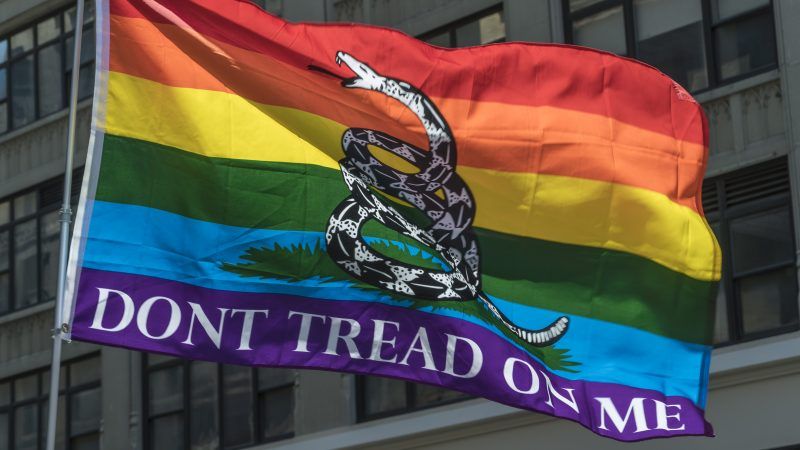With A Republican in the White House, Democrats Rediscover the Virtues of Federalism
Give the Republican Party control of the White House and Congress, and it's only a matter of time before Democrats discover the virtues of devolving authority to state and local governments.

"An illegal assault on states' rights" is the phrase that the attorney general of Massachusetts, Maura Healey, is using to describe the Trump administration's effort to strike down California's strict standards for automobile emissions.
Healey and about two dozen other state attorney generals sued the Trump administration to try to get Washington to leave the states alone on this matter.
This is amusingly satisfying in so many ways that it's hard to know exactly where to start, but perhaps the best place is with an "I told you so."
The month Trump was elected, back in 2016, I wrote in a column for the Las Vegas Review-Journal, "It took an election that gave the Republican Party control of the White House, the Senate and the House of Representatives, but at long last the American left is starting to discover the virtues of devolving authority to state and local governments."
Then, back in August of 2018, I wrote, "Could California's liberal Democratic attorney general end up asking conservative justices on the U.S. Supreme Court to strike down the federal Clean Air Act as an unconstitutional infringement on states' rights? It sure looks as though things are headed in that direction."
The lawsuit by Attorney General Healey and the other state attorneys general, including California's Xavier Becerra, was filed September 20, 2019, in U.S. District Court for the District of Columbia.
Healey's precise phrase—"states' rights," rather than federalism or devolution—has its own historical echoes. Hearing it come from Healey—a proudly progressive Massachusetts Democrat—is downright humorous, given that the New York Times has been busily assuring readers that the concept of states' rights is racist. A Paul Krugman column over the summer described the term as a synonym for a racial slur. As part of the Times' "1619 Project" documenting the long-lasting effects of slavery, columnist Jamelle Bouie attributed the concept of states' rights to John Calhoun, a senator from South Carolina who "was a deep believer in the system of slavery … and a committed advocate for the slave-owning planter class." Bouie writes, "Calhoun's idea that states could veto the federal government would return as well following the decision in Brown v. Board of Education, as segregationists announced 'massive resistance' to federal desegregation mandates and sympathizers defended white Southern actions with ideas and arguments that cribbed from Calhoun and recapitulated enslaver ideology for modern American politics."
Perhaps what's most comical about the situation is how brazenly unprincipled and inconsistent both political parties are when it comes to the question of what should be decided in Washington versus what should be decided in state capitals. If this were a Democratic president trying to impose stricter environmental rules on polluting states, the Maura Healeys and Xavier Becerras of the world would be on the side of Washington. When it was the Obama administration trying to set state Medicaid policy, Republicans were skeptical of centralization and top-down mandates from Washington.
As Ronald Brownstein drily observed in The Atlantic, "While Democrats and Republicans both claim to revere the principle of states' rights, each side, while occupying the White House, has at times leveraged federal authority to override state decisions."
The best way for President Trump to underscore that point would be to offer to settle the case, which is known as California v. Chao. (The plaintiff states are listed alphabetically, so California is first, and the defendants, also listed alphabetically, include the secretary of transportation, Elaine Chao.) He could say that he'd agree to let California and Massachusetts set their environmental rules as strict as they want to—so long as the attorney generals agree that the next time a Democrat controls the White House, then Texas, Kentucky, West Virginia, North Dakota, and other energy-producing states can set their environmental rules as loose as they want to.
If states are going to have rights in any meaningful sense, those rights have to exist independent of which party controls the White House, rather than disappearing when the Democrats are in power in Washington and magically reappearing when Republicans take over.
Certain inalienable individual rights are protected by the federal Constitution. In the Declaration of Independence's view, those rights come from the Creator and don't depend on what state one happens to live in. But for other matters, like auto emissions policy, letting local authorities decide makes a lot of practical and theoretical sense.
The automakers and their Washington-based lobbyists sometimes prefer a single national standard for simplicity's sake. That's worth weighing, but it's not dispositive.
Proponents of national standards also argue that pollution in one state may affect air quality, water quality, or even climate, in another state. But there are other ways to address those issues.
The problem with national standards is that when a president or a Congress wants to ratchet them up or roll them back, it affects the entire country, including parts that would prefer a different policy. Healey works in Boston, where, when history of fighting off rules imposed from faraway capitals is discussed, minds turn not to John Calhoun but to John Adams and John Hancock.


Show Comments (43)